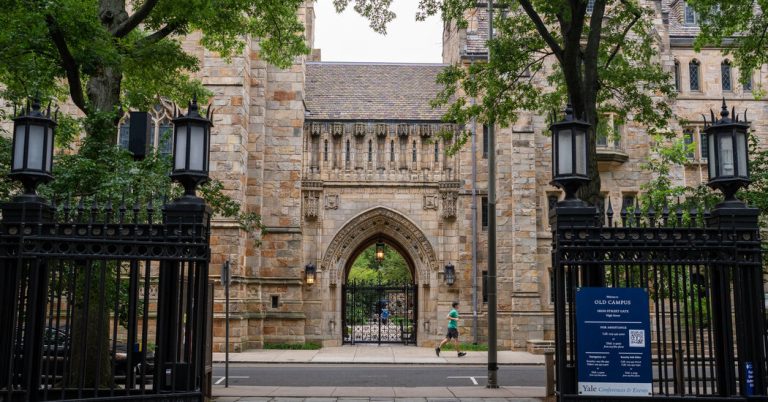Yale University will require standardized test scores for admission for students applying to enter the fall 2025 entering class, becoming the second Ivy League university to abandon the optional testing policies that had been widely adopted during the pandemic of Covid.
Yale officials said in a statement Thursday that the shift to test-optional policies may have inadvertently hurt students from lower-income families whose test scores could have helped their chances.
Although it will require standardized testing, Yale said its policy will be “flexible on testing,” allowing students to submit subject-based Advanced Placement or International Baccalaureate test scores instead of SAT or ACT scores.
Yale’s decision, which will not affect students who applied during the current admissions cycle, follows a similar decision in February by Dartmouth College. Dartmouth, in Hanover, NH, said an analysis found that hundreds of students from lower socioeconomic backgrounds who had good scores — in the 1,400 range on the SAT — refused to submit them, fearing they fell too far below the perfect 1,600. In 2022, the Massachusetts Institute of Technology announced that it had reinstated the testing requirement.
These institutions remain in the minority. Many decided to keep their voluntary testing policies in place as the pandemic eased. Columbia announced last year that the test is optional, and Harvard said it is optional through the graduating class of 2030.
The California university system has instituted a “blind testing” policy, meaning they will not review scores, even if they are submitted.
The University of Michigan, one of the nation’s most selective public universities, announced Wednesday that it is moving to a test-optional policy, which it said is a move to “provide access to high-achieving students from all backgrounds.” Michigan had previously used a flexible testing policy.
More than 80 percent of four-year colleges — or at least 1,825 of the nation’s degree-granting institutions — will not require SAT or ACT scores this fall, according to the FairTest organization, which has campaigned against standardized testing. In 2022, the number of students taking the SAT dropped to 1.7 million, down from 2.2 million in 2020.
The anti-testing movement has long said standardized tests help fuel inequality because many students from affluent families use tutors and coaches to boost their scores.
But recent research has questioned whether optional testing policies may actually be harming the very students they were intended to help.
In January, Opportunity Insights, a Harvard-based group of economists, released a study that found test scores could help identify lower-income and underrepresented students who would thrive in college. High scores from disadvantaged students can signal high potential.
Yale, in New Haven, Conn., said the test scores were especially valuable for evaluating students who attend high schools with fewer academic resources or college preparatory courses.
Jeremiah Quinlan, Yale’s dean of undergraduate admissions, said in a statement that the university had determined that test scores, while imperfect, were predictive of academic success in college.
“Simply put,” he said, “students with higher scores were more likely to have higher Yale GPAs, and test scores are the single largest predictor of a student’s performance in Yale courses in every model we’ve built.”
When students don’t submit test scores, the admissions committee focuses on other elements of the student’s record, Mr. Quinlan said.
“For students attending well-resourced high schools, substitutes for standardized tests are relatively easy to find: Transcripts are filled with advanced courses, teachers are used to praising students’ unique contributions to the classroom, and activity lists are full of enrichment opportunities”, he told the STATEMENT. “Increased emphasis on these elements, we found, has the effect of benefiting the favored.”
After the Supreme Court’s ruling last year barring race-conscious admissions, many experts predicted that some schools would use optional testing policies to protect themselves from future litigation. In the cases against Harvard and the University of North Carolina, standardized test scores were used to show disparate admissions treatment for certain ethnic and racial groups.
In an interview, Mr. Quinlan said Yale took that into account in its decision about whether to reinstate the testing requirements.
“I think we’re pretty confident that we can still run a fairly careful and legitimate admissions process with this policy,” Mr. Quinlan said. “We could not let this legal concern or potential litigation affect this important decision.”
In its announcement, Yale released the midrange of SAT and ACT scores for the first class of 2020. Since Yale instituted a test-optional policy, the university said about half of applicants had not submitted SAT or ACT scores.
Applications to Yale and other highly selective schools have increased as a result of optional testing policies. Yale, which has an acceptance rate of about 4 percent, recently said it had received more than 57,000 applications for admission this fall, a record number and an increase of about 20,000 from 2019, before the pandemic. The increase included a huge number of international students, Mr Quinlan said.
“Quality and quantity were not increasing in lock step,” Mr Quinlan said.
Bob Schaeffer, FairTest’s director of public education, downplayed the potential impact of Yale’s move. “Given that an overwhelming percentage of Yale’s prospective applicants will have taken Advanced Placement or International Baccalaureate exams, which have long been an admissions factor at ultra-selective institutions, the impact will not be very significant,” he said.
But he thought the new policy could create a barrier for international students, some of whom have complained of limited access to standardized tests.
“I think it’s safe to say we’re going to see some reduction going forward,” Mr Quinlan said. “We don’t want more applications. We want the right applications.”




